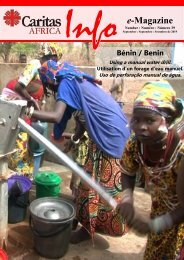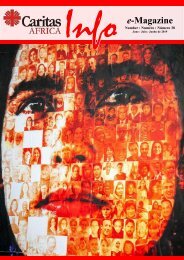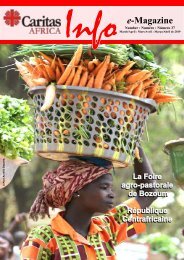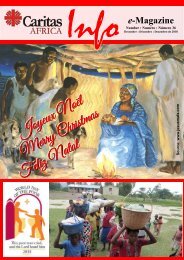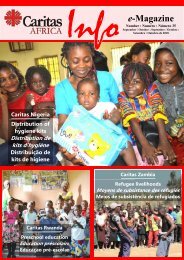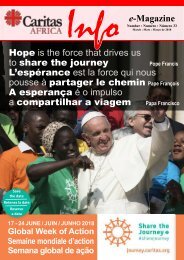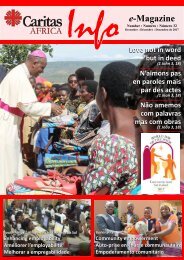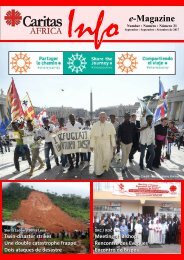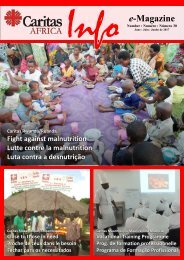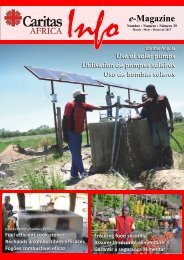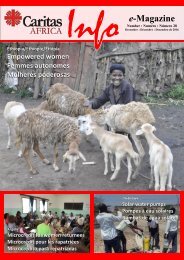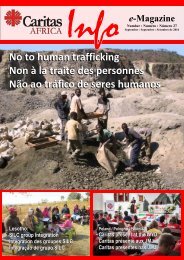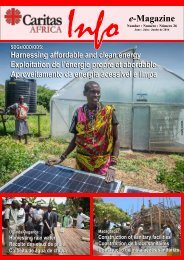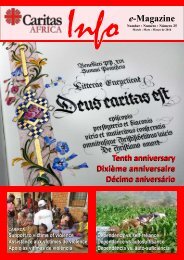Info June 2018
You also want an ePaper? Increase the reach of your titles
YUMPU automatically turns print PDFs into web optimized ePapers that Google loves.
Nairobi, Kenya<br />
Launch of PARCAP and RECS projects<br />
From 23 to 27 April <strong>2018</strong> representatives<br />
of 11 Caritas from<br />
Africa – Ethiopia, Ghana, Guinea,<br />
Kenya, Madagascar, Niger, Uganda,<br />
the Democratic Republic of Congo<br />
(invited as an observer and to share<br />
its experience in this area), Sierra<br />
Leone, South Sudan, Zambia – gathered<br />
in Nairobi for the launch of two<br />
regional programs: the Caritas Africa<br />
Mobilisation Enhancement support<br />
Project on Advocacy for the promotion<br />
of Right to Food (PARCAP) and<br />
the Resilience Enhancement and<br />
Capacity Building Project (RECS).<br />
The Most Rev. Zacchaeus Okoth,<br />
Archbishop of Kisumu, was invited to<br />
deliver the keynote address to the<br />
participants on “The role of the<br />
Church regarding Food security in<br />
Africa”.<br />
The two programs<br />
aim to strengthen the<br />
advocacy capacities<br />
of the Caritas with a<br />
common goal: to contribute<br />
through advocacy<br />
to the realisation<br />
of the right to food for<br />
the most vulnerable<br />
and to the implementation<br />
of the Sustainable<br />
Development<br />
Goal No. 2 on the<br />
elimination of hunger, food security<br />
and sustainable agriculture. The first<br />
project was funded by the Caritas<br />
Internationalis General Secretariat<br />
under the Regional Development<br />
Fund while the second project was<br />
supported by Caritas South Korea<br />
(Caritas Korea).<br />
These programs started in 2017 and a<br />
number of activities preceded this<br />
joint event: exchanges with the Caritas<br />
concerned to share the documents on<br />
these two projects, identification of the<br />
focal points, launch of a survey to<br />
establish the baseline situation for<br />
each of the 10 Caritas in terms of<br />
engagement in advocacy for food<br />
security, participation of a Caritas<br />
Ethiopia delegate at the Caritas Asia<br />
Regional Workshop on Justice and<br />
Resilience in Climate Crisis in December<br />
2017 in Bangkok (Thailand), development<br />
of Terms of Reference for the<br />
joint workshop, identification of stakeholders<br />
and development of training<br />
modules.<br />
The discussions were lively and participants<br />
showed a great interest in the<br />
topics covered – among others, the<br />
social teaching of the Church on the<br />
right to food, the 2030 Agenda for<br />
Sustainable Development, the role of<br />
The Most Rev. Zacchaeus Okoth, Archbishop of Kisumu, with participants.<br />
Caritas in the Church and its advocacy<br />
mission for the poor, strategic planning<br />
of advocacy actions. These theoretical<br />
contributions have been enriched<br />
by the perspectives of participants<br />
from different countries, who<br />
have shared their experiences and<br />
exposed transferable practices to sister<br />
Caritas.<br />
A representative of the Kenyan<br />
Ministry of Agriculture spoke at the<br />
Caritas Africa <strong>Info</strong>: page/página 17<br />
workshop to present Kenya’s experience<br />
in sustainable agriculture and<br />
food security, mentioning the role of<br />
Agriculture in the 2063 agenda of the<br />
African Union and how Kenya<br />
contributes to it.<br />
In addition, the workshop also included<br />
a field visit to the Kiambu Dairy<br />
Project site in Kaibere Village (Kiambu<br />
County, Thika) managed by Caritas<br />
Nairobi. This project allows farming<br />
families to increase their income<br />
through the practice of smart and<br />
organic farming, dairy production and<br />
reuse of waste for the production of<br />
organic gas. Participants were able to<br />
observe these projects and interact<br />
with families in the light of the previously<br />
presented notions. They<br />
found that the three dimensions<br />
(economic, social and environmental)<br />
of sustainable development<br />
were indeed<br />
combined in the integrated<br />
approach of<br />
this project.<br />
Based on these observations<br />
and the reflections<br />
on the problems<br />
of food insecurity faced<br />
by African countries,<br />
the participating<br />
Caritas developed action<br />
plans for advocacy<br />
at the national level, as well as<br />
stra-tegic orientations at the regional<br />
level. Changes in legislation (including<br />
support for small-scale farming),<br />
implementation of social policies,<br />
training of small farmers on access to<br />
productive resources and public<br />
awareness can be found in several of<br />
these plans. This advocacy exercise<br />
will also target the Church through<br />
sensitization to increase its mobilisation<br />
on these urgent issues.



